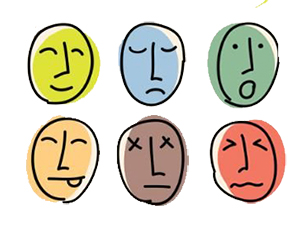Emotional Acceptance by Brent Michel

What have you done today to try and control how you feel? Take a moment, and consider all the ways, large and small, you’ve tried to exert influence over your emotional landscape since waking up this morning. Maybe you had some coffee to feel less tired. Maybe you listened to a podcast in the car to take your mind off work and feel less stressed. Maybe you had a hard day, and spent some time talking to an encouraging loved one to feel less defeated and alone in your difficulties. Whether we realize it or not, we spend a great deal of time and energy controlling our emotions, or at least trying to. Much of the time, this isn’t a problem. But sometimes, our attempts to feel a different way can get us into trouble. Watching an episode of our favorite show to unwind after studying isn’t an issue, but staying up late binging an entire season to avoid feelings of anxiety caused by an upcoming exam will not only ruin your sleep schedule, but likely intensify the very feelings of anxiety you had endeavored to avoid in the first place.
Steven C. Hayes, the founder of Acceptance and Commitment Therapy, is keenly aware of the potential downsides of this sort of behavior, which he coins Emotional Avoidance. A certain amount of Emotional Avoidance is perfectly healthy. However, sometimes our Emotional Avoidance carries with it a serious cost.
Procrastination is a nearly universal experience that illustrates the problems with excessive Emotional Avoidance. Dr. Timothy Pychl, a leading researcher on the topic, elegantly describes procrastination as “short term mood management”. We sit down to write a paper, but we feel anxious, overwhelmed, uncertain, or just plain bored. An easy short-term fix to our negative emotions is to do something else, and we immediately feel better when we open up Facebook in another tab, or click on a Youtube video, or start up a video game. The problem is, when we return to our paper, whatever negative feeling we experienced before is still there, and likely much worse now that we have that much less time to finish the assignment. Our stress grows larger and larger, and so we want to avoid it more and more, and a vicious cycle emerges where we avoid our negative feelings, but they become more negative as a consequence of our avoiding them, and so we want to avoid them even more.
Emotional Avoidance is a problem when the costs of avoiding our emotions outweigh the benefits. Besides procrastination, other potential examples include steering clear of social gatherings to avoid feelings of anxiety, lying about achievements to avoid feelings of inadequacy, and abusing substances to avoid feelings of sadness and loneliness. All of these short-term mood management strategies are likely to not only make the original problem worse but bring with them brand new problems.
Acceptance and Commitment Therapy proposes that the solution to problematic Emotional Avoidance is Emotional Acceptance. Emotional Acceptance means stopping our frantic attempts to avoid negative feelings, and instead bring them into our awareness and allow them to exist, as they are. Bringing negative feelings into awareness is the first step because often we avoid feelings without even realizing that we are feeling them in the first place. When you reflexively reach for your phone to browse Instagram instead of studying for that test, you may not even notice the feelings of frustration and confusion flowing through you before you instinctively act to avoid them. If there’s an area in your life where you find that you behave in ways that don’t align with your intentions and values, ask yourself: “Are there feelings that I’m trying to avoid when I do this?”. Pay attention; be like an emotional detective. The next time you find yourself eating a bunch of junk food that you know will just make you feel sick later, or getting in a pointless argument with a loved one, or playing video games instead of sending out that job application, ask yourself: “What emotions am I experiencing right now that I’m desperately trying to avoid?”.
The second step is to then let these negative emotions exist, just as they are. This doesn’t mean being passive, or helpless, or letting the emotions completely take you over. Most of the time, our negative feelings are not nearly as large and frightening as our problematic attempts to avoid them would make them seem. Often, we can still act in ways that align with our values even when we’re experiencing negative emotions. We can still work on that paper, even while feeling somewhat overwhelmed by the page requirement. We can also take actions that are more effective at managing our negative feelings and less likely to produce problematic side-effects, such as breaking down an overwhelming assignment into small manageable chunks, instead of firing up Netflix.
As you begin to notice the ways in which Emotional Avoidance causes issues in your life, it’s important to remember not to be too hard on yourself. Wanting to avoid negative feelings and experience positive ones is a deeply human instinct, and largely responsible for our evolutionary survival as a species. We all have habitual ways in which we attempt to avoid negative feelings and judging ourselves for this is likely to only make the problem worse.
If you’d like to learn more about Emotional Acceptance and Acceptance and Commitment Therapy, you might find the following resources interesting and useful:
- Categories: